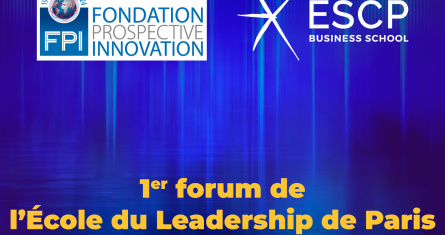The leadership we need today—and how to cultivate it
Ahead of the first leadership forum of the École du Leadership de Paris, we share former French Prime Minister and ESCP alumnus Jean-Pierre Raffarin’s reflections on why our fractured world demands leadership shaped by shared vision, ethics, and service over ego.
From command to coherence: rethinking the role of the leader
Leadership is in crisis. Complexity, turmoil, and polarisation are reshaping every sphere, from boardrooms to parliaments. Trust is eroding, institutions are faltering, and the demands on leaders are multiplying against a growing backdrop of uncertainty.
In this context, traditional leadership models—rooted in hierarchy and rigid control—are increasingly out of step with the world they’re meant to lead. The pace and multiplicity of today’s challenges demand a new kind of leadership: one that listens before it leads, adapts before it asserts, and unites rather than divides.
Jean-Pierre Raffarin, former French Prime Minister and ESCP alumnus, has long asserted that empowerment, integrity, and shared purpose are the defining traits of effective leadership. “There must be harmony between the leader and their followers, and among all participants who, together, accept to be led in a direction they approve of along a path they are happy to follow.”
How can we cultivate this kind of leadership within institutions, companies, and countries? This and other questions helped guide the inaugural leadership forum of the École du Leadership de Paris, a think tank and dialogue platform created by the Fondation Prospective & Innovation (FPI)—currently chaired by Raffarin—and ESCP Business School.
The forum, held on 20 May 2025 in Paris, brought together thinkers and practitioners from across politics, business, science, the military, and the arts to confront today’s core leadership dilemmas: how to lead with vision in a fractured world, how to resist the ethical drift of power, and how to act when the path ahead is uncertain.
There must be harmony between the leader and their followers, and among all participants who, together, accept to be led in a direction they approve of along a path they are happy to follow.
When the old models of leadership no longer work
“Not all leadership is good,” cautions Raffarin. “The leadership of a dictator is a distortion of leadership.” At the heart of his philosophy lies a characteristically European vision of leadership, one that privileges dialogue over dominance, and moral clarity over brute efficiency. It is an approach forged through decades of public service and international diplomacy on Raffarin’s part.
Raffarin’s approach echoes elements of servant leadership, a model first developed in the 1970s that flips the traditional power dynamic: the leader exists to serve, not to rule. In an era marked by uncertainty, complexity, and volatility, servant leadership offers a framework for long-term resilience, rooted in humility, listening, and collective growth.
It is in this spirit of coherence between values, purpose, and action that Raffarin captures in his own definition of good leadership. “It is a leadership of harmony. Harmony between the destination and the path. I propose a perspective, a horizon, and a path to reach that goal. That is what it means to lead.”
Having a strong vision is essential. It’s about the ability to offer clarity in complexity, to frame direction without pretending to know every answer. Vision means cultivating purpose, shared, lived, and adaptable. It means looking beyond immediate gain to long-term resilience.
The École du Leadership de Paris: exploring leadership in an age of uncertainty
The first forum of the École du Leadership de Paris was co-convened by Raffarin, alongside Emmanuelle Pérès (Director General, FPI), Philippe Houzé (President, ESCP), and Léon Laulusa (Executive President & Dean, ESCP). Structured around two core roundtables — one chaired by Raffarin, the other by ESCP Professor Maria Koutsovoulou — the forum brought together high-profile figures from public and private life to examine not only what leadership requires today, but what must be unlearned from yesterday.
As institutions confront rising pressure from climate disruption, AI acceleration, democratic erosion, and widening inequality, exchanges like these become more critical in cultivating the leadership we need. Because the leadership we need today is not about commanding the future. It is about earning trust, holding vision, and staying human, even when the path is uncertain.
As Raffarin reflects, “Balanced leadership, shared leadership that is the leadership of the future.”
Balanced leadership, shared leadership that is the leadership of the future.
Relevant links
Campuses
